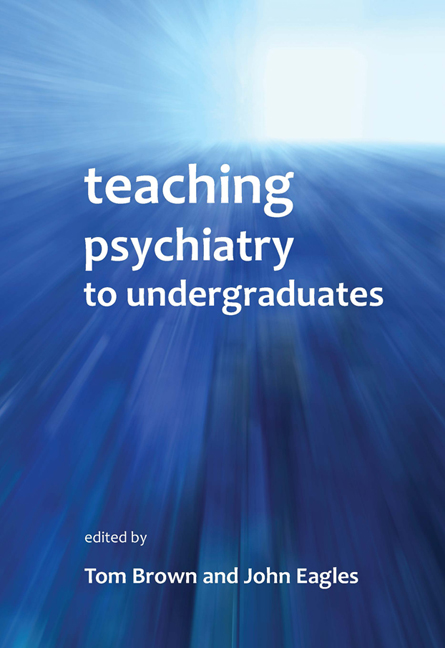Book contents
- Frontmatter
- Contents
- List of figures, tables and boxes
- List of contributors
- Preface
- Foreword
- 1 How do students learn?
- 2 Recent developments in undergraduate medical education
- 3 Undergraduate psychiatry teaching – the core curriculum
- 4 The organisation of undergraduate teaching
- 5 Assessment of undergraduates in psychiatry
- 6 Using computers to teach undergraduate psychiatry
- 7 How to give a lecture
- 8 How to do small-group teaching
- 9 Problem-based learning
- 10 Teaching trainee psychiatrists how to teach medical students: the Southampton model
- 11 Involving trainees in teaching
- 12 Involvement of service users in psychiatric education
- 13 Time-efficient clinical teaching
- 14 Intercalated degrees
- 15 Undergraduate experiences of psychiatry: a student view
- 16 Integration: teaching psychiatry with other specialties
- 17 Teaching the teachers in a cross-cultural setting: the Scotland–Malawi Mental Health Education Project
- 18 International undergraduate teaching
- 19 Teaching with simulated patients and role-play
- 20 Undergraduate medical education and recruitment to psychiatry
- 21 Choosing psychiatry: factors influencing career choice among foundation doctors in Scotland
- 22 Funding of the teaching of medical undergraduates
- 23 Dealing with students in difficulty
- 24 Training medical students to promote good mental health in secondary schools
- 25 Women in medicine
- Index
4 - The organisation of undergraduate teaching
- Frontmatter
- Contents
- List of figures, tables and boxes
- List of contributors
- Preface
- Foreword
- 1 How do students learn?
- 2 Recent developments in undergraduate medical education
- 3 Undergraduate psychiatry teaching – the core curriculum
- 4 The organisation of undergraduate teaching
- 5 Assessment of undergraduates in psychiatry
- 6 Using computers to teach undergraduate psychiatry
- 7 How to give a lecture
- 8 How to do small-group teaching
- 9 Problem-based learning
- 10 Teaching trainee psychiatrists how to teach medical students: the Southampton model
- 11 Involving trainees in teaching
- 12 Involvement of service users in psychiatric education
- 13 Time-efficient clinical teaching
- 14 Intercalated degrees
- 15 Undergraduate experiences of psychiatry: a student view
- 16 Integration: teaching psychiatry with other specialties
- 17 Teaching the teachers in a cross-cultural setting: the Scotland–Malawi Mental Health Education Project
- 18 International undergraduate teaching
- 19 Teaching with simulated patients and role-play
- 20 Undergraduate medical education and recruitment to psychiatry
- 21 Choosing psychiatry: factors influencing career choice among foundation doctors in Scotland
- 22 Funding of the teaching of medical undergraduates
- 23 Dealing with students in difficulty
- 24 Training medical students to promote good mental health in secondary schools
- 25 Women in medicine
- Index
Summary
Introduction
The organisation of undergraduate teaching is the province of individual universities, but since the publication of Tomorrow's Doctors in 1993 (General Medical Council, 1993, with subsequent editions in 2003 and 2009), the emphasis has shifted from the acquisition of factual knowledge to that of relevant attitudes and skills, with a core curriculum and self-directed learning. Clear roles were defined and guidance issued for all the key players, including universities, National Health Service (NHS) trusts, individual trainers and medical students. This has led to a broad redesign in many universities, with ‘vertical’ themes (see Chapter 2) running throughout the course and the development of new methods of assessment to reflect the new emphasis in training.
Concurrently, there has been a major change in psychiatric practice. Community-based care has become the norm and the creation of specialist services such as crisis teams has led to a significant reduction in psychiatric in-patient facilities, where, traditionally, most of undergraduate medical education was delivered(see Chapter 15 for a medical student view of some of the problems this can create). The problem has been compounded by the significant increase in the number of medical students (Department of Health, 2004). In some parts of the UK, it is now not unusual to see 12 students posted on an in-patient unit with 30 beds, jostling for precious patient contact with nursing and occupational therapy students, while other universities send their students over a large geographical area to find suitable placements .
Change has also occurred within the universities. The research assessment exercise, which dictates the academic standing and funding of universities and departments, has placed a major emphasis on the production of high-quality research papers. At times, this has led to the withdrawal from teaching of those extremely well placed to carry it out. Financial pressures in the NHS have also led to a reduction in the number of clinical academic posts (House of Commons Health Select Committee, 2006).
- Type
- Chapter
- Information
- Teaching Psychiatry to Undergraduates , pp. 38 - 51Publisher: Royal College of PsychiatristsPrint publication year: 2011



